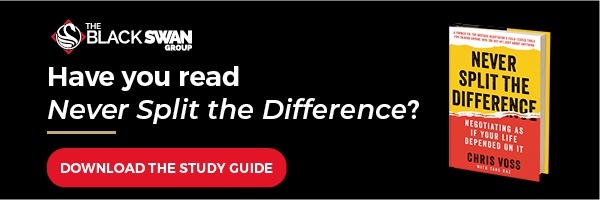 The most dangerous negotiation is the one you don’t know you’re in.
The most dangerous negotiation is the one you don’t know you’re in.
Last June, Taylor Swift wrote one of the most elegant confrontations in the history of individuals confronting multinational corporations. Ever. I was so blown away I had to write about it back then.
Since then, what did her deference, elegance, and empathy achieve in confronting Apple about their unfairness?
Not only did she make her point – she got what she wanted and established a great relationship.
Have you seen the first video she did for Apple’s streaming music service? It’s brilliant. She does a spectacular face-plant on a treadmill while running. I had to watch it 3 times to convince myself she did it herself and that there wasn’t a stunt-double.
Yesterday, a new video ad debuted of her singing “The Middle” by Jimmy Eat World. Back in December she agreed to make her 1989 World Tour documentary available exclusively through Apple. There is clearly more to come from this partnership they’ve reached.
How does she get to this position of strategic partnership with a company that has the 2nd largest market cap in the world? After confronting them head-on nonetheless? Apple ’s economic clout is bigger than most countries.
Was her confrontation with them a Donald Trump sort of name-calling, public bashing negotiation? Nope. She started with “To Apple, Love Taylor.” Did Donald Trump ever say “To Megyn, Love Donald”, “To Ted, Love Donald” or “To Hillary, Love Donald”? Nope.
Here’s a comparable analogy:
A top CEO I was once listening to (let’s call him Ted) described a merger negotiation he was in. At the final stages, he was meeting in a restaurant with his counterpart CEO. Suddenly his male counterpart slammed his hands down on the table and stormed out. Ted shrugged his shoulders and thought to himself, “Well, many negotiations fail anyway. I’ll just move on.”
Several months later, this reality show-like demonstrative CEO called Ted back and said “I apologize for the way I behaved and I want you to know that if we could restart the negotiations, we’d be pretty close to yes.” (My instant reaction to this was “Yes! Ted won!”)
Ted thought about it for a moment, said “No” and hung up. Why? His explanation: “If this is the way this guy handles every problem, I don’t need this constant aggravation.”
You know what? Few people need that constant aggravation. And it doesn’t take too many episodes of déjà vu before they come to that conclusion.
How did Taylor Swift solve her international negotiation? With respect, appreciation, and even deference. Deference can be the stealth bomber of confrontation. Especially, if coupled with the appreciation and the indisputable truth.
Ms. Swift continued, “I find it shocking, disappointing, and completely unlike this historically generous company.”
What are they supposed to say to that?
There’s also another key to the sequence of what she says here – the positive attributes she recognizes are last in this sentence. Residue is everything. It’s one of the reasons most confrontations are damaging. We want the words that “taste” best when we utter them to be last – thereby leaving a residue that stings rather than encourages the behavior we want.
She starts with an “I-message” – “I find it shocking, disappointing…” and contrast it with positive name-calling – “(you are) historically generous…”
As I observed last year, it’s also easy to forget that Apple’s intervention into the music world convinced music lovers globally to pay 99¢ for something they were getting for free. (Remember Limewire and Napster?)
And then, she worked her way to the indisputable truth: “It is unfair to ask anyone to work for nothing”. Bang.
She follows this with more respect and appreciation.
What did this confrontation get her? Watch the video.
To summarize:
- Open with appreciation & respect (even deference)
- “I” message carries the negative and immediately follow with
- Positive name-calling
- Indisputable truth
- Appreciation
These are the keys to direct confrontation. She would have been a great hostage negotiator. She is a great businesswoman and business leader. I’d even say a Black Swan!

